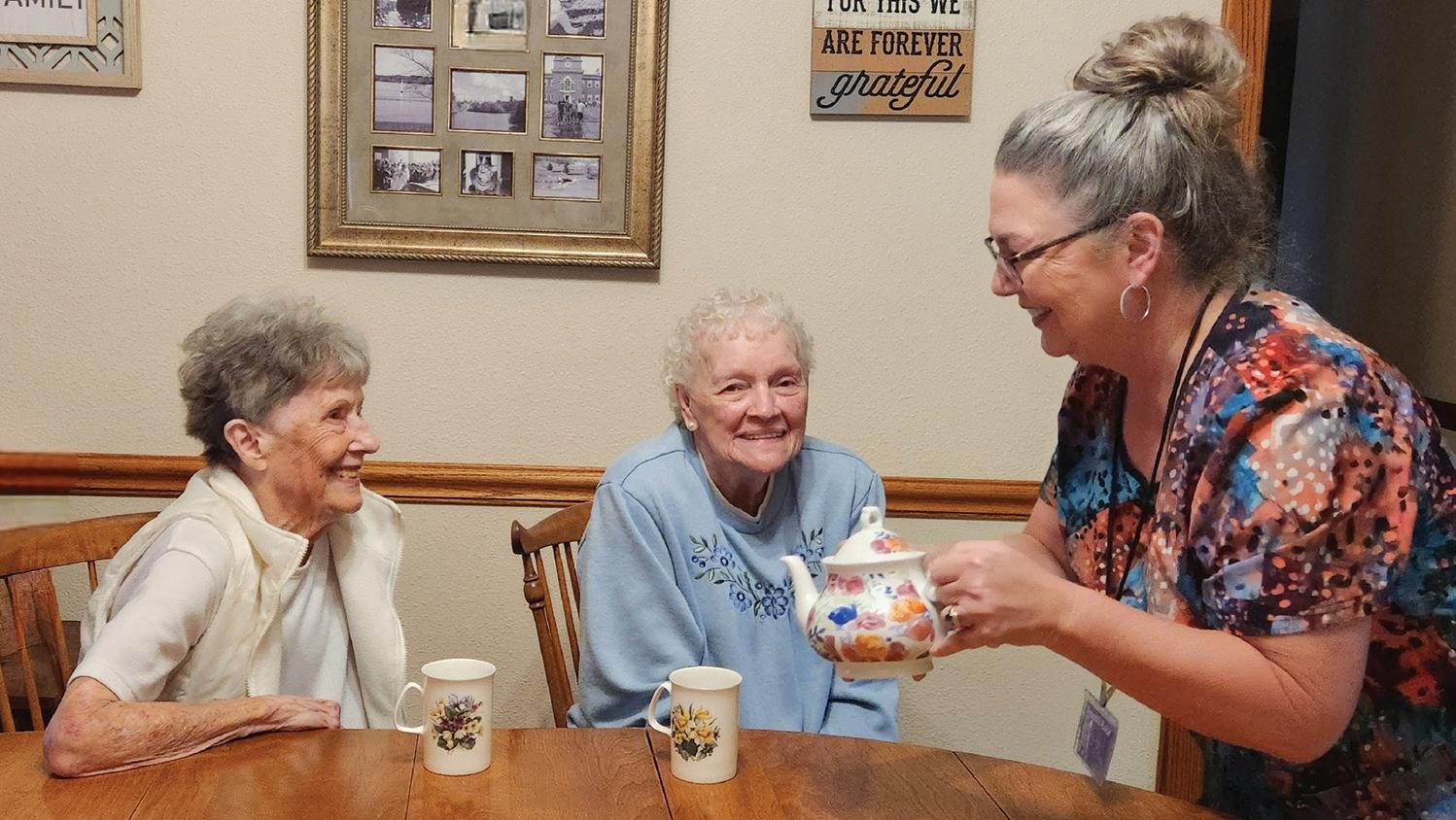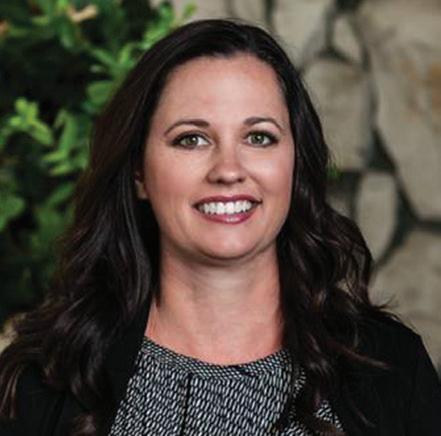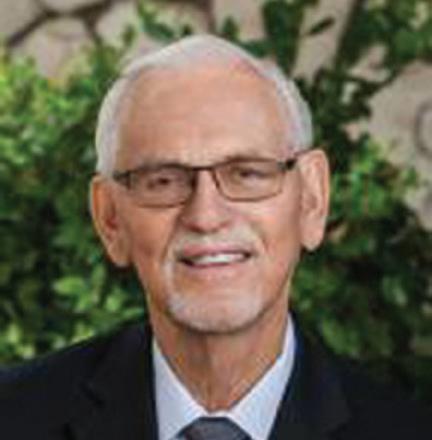SENIOR LIVING
 ISSUE #43 - SEPTEMBER 2023
ISSUE #43 - SEPTEMBER 2023


PUBLISHER

Hank Vander Veen EDITOR
Kristina H . Hacker
ART DIRECTOR
Harold L . George

GRAPHIC DESIGNER
Sharon Hoffman
SALES & MARKETING



 ISSUE #43 - SEPTEMBER 2023
ISSUE #43 - SEPTEMBER 2023


PUBLISHER

Hank Vander Veen EDITOR
Kristina H . Hacker
ART DIRECTOR
Harold L . George

GRAPHIC DESIGNER
Sharon Hoffman
SALES & MARKETING


Though a significant percentage of individuals report desires to retire later in life, many people stop working around the age of 62. The desire for a later retirement may stem from financial concerns or because some people wonder just what they will do when they’re no longer working.
Retirement is a time for hardworking individuals to enjoy themselves and their newfound free time. Interacting with the community can keep the brain engaged and foster beneficial social connections. In recognition of the value of staying engaged, the following are a few ways for seniors to become more involved in their communities.

● Join a club or group. Identify an activity you find interesting and
determine if there is a way to get involved with it in your community. Senior centers or adult activity providers may sponsor local programs.
● Participate in worship. Many older adults find they want to reconnect with their faith at this point in their lives, even if attending services hadn’t been a top priority earlier in life. Reach out to your local house of worship and find out when services take place and which activities they offer.
● Read to children. Volunteer your services at the library by reading to youngsters. Interacting with other generations can be inspiring.
● Volunteer at a soup kitchen or food pantry. Times continue to be challenging for many people who may
find it hard to cover their expenses. Soup kitchens and food pantries can be a saving grace for those who might otherwise miss meals. Volunteering some hours at these organizations can do worlds of good and help you make a difference.
● Befriend neighbors. A passing ‘hi and bye’ wave may have been the norm when you were busy working a job. Now that you have free time, you can get to know neighbors better and even take turns hosting get-togethers. Moving to a retirement or active adult community with others in similar positions may facilitate such friendships.
● Volunteer with local government. Find out ways you can become involved
civically. Perhaps you can run in a local school board election or try to become a member of the town council?
● Become a substitute teacher or paraprofessional. Many schools are experiencing shortages of qualified staff. You may find your place helping to shape the minds of youngsters by volunteering at schools or taking on part-time jobs in the classroom.
Seniors can be more engaged in their communities, thus strengthening their ‘social capital,’ the term scientists often use to describe the strength of their social relationships, and the extent to which people feel physically and emotionally supported by their communities.
People are living longer, a reality that can be traced to a number of factors, including advancements in medicine and greater dissemination of information regarding preventive health care. According to data from the United Nations Population Division, the average life expectancy in the United States is 81.65 for women and 76.61 for men. Canada has even higher life expectancies, at 84.74 for women and 81.15 for men. As people live longer, some may outlive their significant others and ultimately find themselves once again interested in sharing experiences with a special someone. Seniors ready to re-enter the dating pool may find that things are quite different from what they experienced as naive teenagers or young adults. Dating used to be about hanging out with friends and meeting people at shared events, such as school dances or work parties or even while enjoying a night out with friends. Nowadays, dating often begins in cyberspace. This can be confusing and anxiety-inducing for adults who didn’t grow up with technology guiding their every move.
According to a report in The Atlantic, more than
one-third of baby boomers are not currently married, and this generation has had higher rates of separation and divorce and lower rates of marriage than the generations that preceded them. Many boomers have years ahead of them to devote to new relationships. Here’s what they may want to know before navigating twentyfirst century dating waters.


● You’re not in this alone. While online dating may be portrayed as a young person’s game, plenty of older adults are now finding connections online. In fact, many different dating apps are geared toward the senior set, including SeniorMatch, eHarmony, Singles50, OKCupid, and Silver Singles, among others.
● You have more time for fun. As a senior, you may have more time to devote to recreation and leisure. This can be a great opportunity to get out and meet someone who shares your passions and interests.
● Online dating has its advantages. While online dating apps and websites may have certain things working against them, particularly if their algorithms for pairing people are not fine-tuned, they also can be helpful. Online dating can expand social circles beyond
local neighborhoods or even states, provinces or countries. You’re casting your net over a much larger body of water. Furthermore, dating app profiles typically spell out exactly what another person is seeking, which can save seniors from having to revisit awkward dating moments from years past.

Seniors may have to navigate new waters in modern dating. But with a good mindset and a little persistence, it is possible for seniors to find a special someone in cyberspace.

Travel was once a key component of the picture working professionals created of their ideal retirements. While the COVID-19 pandemic put many retirement travel plans on hold in recent years, jetting off to distant locales is once again on retirees’ radars.
A 2022 survey from AARP found that individuals 50 and over were poised to not only get back on the road, but also spend significantly more money on travel. Prior to the pandemic, Americans 50 and over spent $7,314 annually on travel, according to data from AARP. By spring 2022, individuals in that same age bracket indicated a readiness to spend $8,369 on travel.
Eagerness to get back on the road, in the air or on the high seas could make it easy to overlook some principles of safe travel. However, such an oversight could lead to complications that could make it hard to enjoy time away from home. The following tips can reduce the likelihood that seniors encounter trouble while traveling.

● Determine if any health issues are affecting your desired destinations. The Centers for Disease Control and Prevention has a website devoted to travel vaccines (cdc.gov/travel/page/ travel-vaccines), and that page can be an invaluable resource for individuals planning a vacation. What’s more, the CDC even provides a specific list of destinations and the latest travel health notices for each of those nations. That list, accessible at cdc.gov/travel/destinations/ list can help seniors determine if there are any health-related safety issues in countries they hope to visit.
● Speak to your physician. A pre-trip consultation with a physician can uncover any issues that might arise




while you’re away. Such issues may be easily managed for domestic travelers who are not planning to visit any especially remote locations, but they will not necessarily be as easily navigated when traveling overseas. Physicians can recommend certain vaccinations or measures to ensure your health while away. In addition, a pre-trip doctor visit is a great time to refill prescriptions that you will need while you’re away.
● Take financial precautions as well. Of course, not all travel-related concerns are medical. Finances also require some pre-trip attention. Inflation has caused a sharp spike in the price of various commodities since the start of 2022, so travelers should study up on the cost of food and attractions at their destination to ensure they have enough money to enjoy themselves. Baggage costs have risen significantly in recent years, so seniors traveling on a budget may want to pack less and do laundry while traveling in an effort to save money. In addition, the unpredictable nature of travel since the onset of the pandemic has underscored the utility of travel insurance. Seniors can look into travel insurance that could reimburse them in the case of delays or cancellations.
● Privately share your itinerary. Prior to departing, share your itinerary with friends and family. Avoid sharing the itinerary on social media platforms, which can make you a target for criminals at home and at your destination. The itinerary should include where you’re staying, the dates you’re visiting certain locations and the dates of activities you’ll be engaging in on your trip. Seniors rediscovering the joy of traveling can take various measures to make their trips more safe.


No one is immune to issues that can adversely affect their mental health, including men and women nearing retirement age and those who are already retired. Though the term ‘golden years’ suggests life in retirement is one sunny day after another, many individuals 60 and older are dealing with mental health issues.

According to the World Health Organization, approximately 15 percent of the world’s adults aged 60 and over suffer from a mental disorder. What makes that statistic even more troubling is that the WHO acknowledges it likely doesn’t paint the most accurate picture of seniors and mental health, as depression is often undiagnosed among older men and women and untreated because it co-occurs with other issues affecting seniors.
In the past, the Centers for Disease Control and Prevention has acknowledged that late-life anxiety was not readily understood. However, much progress has been made in recent years thanks to a heightened awareness of the problem of seniors and mental health. That means seniors now have ample resources they can look to as they seek to learn what they can do to safeguard their mental health.
The National Institute of Mental Health notes that recognizing the signs of mental health issues is the first step to getting treatment. Mental health issues vary, and individuals with anxiety will likely experience different symptoms than those with depression. But the NIMH notes that the following are some of the warning signs of mental health issues.
● Noticeable changes in mood, energy level, or appetite
● Feeling flat or having trouble feeling positive emotions
● Difficulty sleeping or sleeping too much
● Difficulty concentrating, feeling restless, or on edge

● Increased worry or feeling stressed
● Anger, irritability, or aggressiveness

● Ongoing headaches, digestive issues, or pain
● Misuse of alcohol or drugs
● Sadness or hopelessness
● Suicidal thoughts
● Engaging in high-risk activities
● Obsessive thinking or compulsive behavior
● Thoughts or behaviors that interfere with work, family, or social life
● Engaging in thinking or behavior that is concerning to others
● Seeing, hearing, and feeling things that other people do not see, hear, or feel
As noted, a growing awareness of mental health issues and how they affect seniors has translated to more available resources for aging men and women who need help. Within the United States, seniors can visit the NIMH Help for Mental Illnesses webpage (https://www. nimh.nih.gov/health/find-help) to access contact information for various groups that help people in times of mental health crises. In Canada, individuals can visit the Canadian Mental Health Association at https://cmha.ca/find-help/find-cmha-inyour-area/ for contact information for various groups across the country.
The National Institute on Aging notes that most cases of depression cannot be prevented. However, the NIA also notes that healthy lifestyle changes can have long-term benefits of seniors’ mental health. Such changes include:

● Being physically active
● Eating a healthy diet that can reduce risk for diseases that can bring on disability and depression
● Getting adequate sleep, which for seniors is between seven to nine hours per night

● Remaining socially active, including regular contact with friends and family


● Participating in activities you enjoy
● Sharing mental issues or concerns with friends, family members and your physician
Research indicates that seniors are vulnerable to mental health issues. More information about how to combat and overcome such issues is available at nimh. nih.gov.

Many adults nearing retirement age count down the days until they can bid adieu to the daily tasks of commuting and working so they can enjoy much more time for recreation, travel or whatever is they aspire to do.
As enticing as unending free time may seem, some retirees find it is not ideal to be entirely free from the responsibility of working. As current seniors can attest, inflation can drive up the costs of living, meaning that seniors who were once able to afford a certain retirement lifestyle may no longer enjoy that hard-earned luxury. Others may miss the daily opportunities to socialize that working provides, or the way problem-solving on the job stimulates the brain. But even retirees who miss working may not be ready to return to the workforce full-time. That can make part-time employment an ideal fit for mature workers.
Here’s a look at some part-time positions that could be a good fit for older adults reentering the workforce.

Working in retail opens seniors up to a wide array of responsibilities and scenarios. Jobs may include greeting customers, making sales, putting out inventory, and helping customers select merchandise. Being personable and having good customer service skills are necessary traits to have when working in retail. Many stores offer part-time employees flexible hours so schedules can be customized.
Retirees who loved their job but wanted to spend less time doing it can return as consultants. According to The Balance: Money, individuals often
find they earn more per hour working as consultants than they did as fulltime staff members. Consulting is a way to share expertise and experience without making a full-time commitment.

A customer service representative is tasked with helping customers solve problems and ensuring customer satisfaction. He or she may work ain a traditional office or store location, or answer calls and resolve issues from home.
Retirees may want to consider jobs working in schools or in related capacities. Driving a school bus is an option if people are willing to undergo the proper training and licensing to operate this type of vehicle. Seniors also may consider working as lunchroom aides or lunch service providers, crossing guards, substitute teachers, and paraprofessionals. School employees will only work a few hours during the day. They’ll also enjoy many holidays off as well as summer vacations.

Receptionists greet patients or customers in office settings. According to AARP, they are the welcoming faces of organizations. Answering phones and light clerical work also may be required of receptionists. Those who want to work off-peak hours can think about working nights and weekends in hospitals or skilled nursing facilities.
Seniors have many different options if they decide they want to return to the workforce in a part-time capacity.

The benefits of spending time in the great outdoors are significant. According to the Centers for Disease Control and Prevention, spending time outdoors may improve mental health and help to reduce stress, and the vitamin D the body absorbs while outside can have a positive effect on blood cells and the immune system.
Seniors can benefit from the great outdoors as much as anyone. Vitamin D helps the body absorb calcium, which strengthens bones. That’s especially beneficial for seniors, as the National Council on Aging notes that bone density often decreases after age 50, which can increase the risk of fractures. That’s especially so in women over the age of 50, as a 2021 report from Amgen, Inc., indicated women can lose up to 20 percent of their bone density within five to seven years of menopause.
Spending time in the great outdoors also provides a social benefit, encouraging individuals from all walks of life, including seniors, to get out of their homes and spend time with other people.

With so much to gain from spending time outside, seniors can consider these three outdoor exercises as they seek to maintain or improve their overall health.

1. Walking: Walking is free and effective. In fact, WebMD notes that a brisk 30-minute walk can improve blood flow, contribute to a stronger heart, strengthen bones, and even help people sleep better at night. In addition, a 2022 study published in the journal JAMA Neurology found that people between the ages of 40 and 79 who walked about 9,800 steps per day were 51 percent less likely to develop
dementia than people who didn’t walk much at all.
2. Cycling: Riding a bike is both fun and a great form of outdoor exercise. Though many studies regarding the health effects of cycling have looked at the value of riding a bike to work, a scenario that does not apply to retirees, the results of such studies still offer insight into just how valuable it can be to ride a bike. For example, a 2020 study published in the journal The Lancet found that people who cycled to work were 24 percent less likely to die of heart disease and 11 percent less likely to develop cancer. Seniors, whether they are still working or retired, can incorporate cycling into their daily routines and enjoy all the fun and health benefits that riding a bike provides.
3. Hiking: Hiking is a bit more strenuous than walking, particularly when individuals choose to traverse steep and/or rocky terrain. WebMD notes that hiking after age 60 can help people reduce their risk of falls and fractures; lower their risk for a host of ailments, including coronary heart disease, colon cancer and diabetes; reduce blood pressure, even in adults who have already been diagnosed with hypertension; and maintain healthy bones and joints. Hiking is not a onesize-fits-all activity, so seniors, especially those who would characterize themselves as novice hikers, are urged to speak with their physicians prior to hiking trails that are not flat.
Seniors can consider these three fun activities and others as they answer the call of the great outdoors. Walking, cycling and hiking offer a great reason to get out of the house and reap the health-related benefits of spending time outside.
Cognitive health is not something to take for granted. Although a certain level of memory loss can be expected as people age, when the ability to clearly think, learn and remember is compromised, those changes can affect an individual’s ability to perform daily activities and should serve as a cause for concern.
Brain health should be a priority for everyone. The National Institute on Aging says brain health is an umbrella term that encompasses a host of factors, including:

● cognitive health, which is how well you think, learn and remember
● motor function, or how you make and control movements
● tactile function, which is how you feel sensations; and
● emotional function, or how emotions are interpreted and responded to. Individuals can safeguard brain health Ñ particularly cognitive health Ñ by taking these steps.
Working with doctors, individuals can put their health first. This includes getting routine screenings, managing chronic health problems, limiting or avoiding alcohol and nicotine products, and getting the recommended amount of sleep each night.
All chronic conditions cause longterm repercussions, but the NIA indicates that observational studies show having high blood pressure in mid-life increases the risk of cognitive decline later in life. Lowering blood pressure lowers the risk for mild cognitive impairment and possibly dementia.
Harvard Medical School says nurtur-
ing social contacts, engaging in stimulating mental activities like reading and doing puzzles, seeing new places, and learning new things can help keep the brain in top form.
Stress can take its toll on the body, and there is reason to believe that it may adversely affect cognitive health as well. Make every stride to reduce stress, whether that involves taking vacations, meditating, laughing with friends and family, or engaging in relaxing activities
that relieve stress.
Vitamin D is linked to a host health benefits, including its potential to promote a healthy brain. Individuals can get more time outdoors to get vitamin D naturally from the sun and eat foods rich in vitamin D. If doctors find that vitamin D levels are exceptionally low, supplementation can help.
Certain hearing loss has been linked
to cognitive decline, says Healthline. Researchers in Italy concluded that people with central hearing loss had a higher risk of mild cognitive impairment than those with no hearing loss or peripheral hearing loss. Individuals with central hearing loss are urged to speak to their physicians to determine if they can take preventive action to stave off further decline.
Cognitive health should be a priority. Adults can employ various strategies to reduce their risk of cognitive decline as they age.

At Prestige Assisted Living at Manteca, we believe it is not enough to simply care for those we serve, but to also provide residents ways to stay active and engaged by nurturing body, mind and spirit.

As a way to help our residents celebrate life at every age, we proudly offer Celebrations, a wellness-focused lifestyle program that embraces a philosophy of healthy and fulfilled living.
For individuals who may require an additional level of care, we offer our award-winning Expressions Memory Care program. Expressions is designed to keep memory care residents active and engaged while helping them feel accepted, supported and at home.


“Planning ahead for the future gives us peace of mind in the present.”
QUALITY FUNERAL SERVICE SINCE 1932
What constitutes a perfect retirement is different for everyone. Some people may imagine spending their golden years fishing their days away, while others may aspire to finally embrace their inner globetrotter. Though individuals’ retirement dreams differ, every retiree will need money, which only underscores the importance of a wise and disciplined approach to money management.
Average life expectancies have risen considerably over the last several decades. According to estimates from the United Nations Population Division, the average life expectancy in Canada for both sexes is just under 83 years, while it’s slightly more than 79 in the United States. Those figures are a welcome sign, but they may inspire a little fear among seniors who are concerned that they might outlive their money. No one knows how long they will live, but everyone can embrace a handful of money management strategies to increase the chances that they won’t feel a financial pinch in retirement.
● Study up on the tax implications of withdrawing from your retirement accounts. Every retirement investment vehicle, whether it’s an IRA or a 401(k), has tax implications. Money withdrawn too early may incur tax penalties, and even money withdrawn long past retirement age could elevate retirees into a new tax bracket that could prove costly. A financial advisor can help retirees determine the tax implications of withdrawing money from their retirement accounts and may even develop a detailed guideline of when withdrawals should be made and how much should be withdrawn in a given year in order to minimize tax liabilities.
● Prioritize your own needs. Though retirees, particularly those with children and grandchildren, may feel an obligation to help their families in difficult financial times, generosity can be very costly for adults who have stopped working. Retirees may or may not have opportunities to generate new income, and even those who do likely won’t make enough to meet their daily financial needs. Given that reality, retirees must prioritize their own financial needs, including their immediate needs and those they will have for the rest of their lives. Though it might be difficult to turn down loved ones’ requests for financial help, retirees must make sure they can pay their bills and maintain a quality of life that won’t jeopardize their long-term health.
● Examine your housing situation. Equity in a home is a feather in the cap of many retirees. Retirees who own their homes and live in locations with high property taxes might be able to cash in on their equity by selling their homes and downsizing to a smaller home with lower property taxes. If moving is not a consideration, discuss a reverse mortgage with a financial advisor. A trusted financial advisor can highlight the advantages and disadvantages of reverse mortgages, which are a great option for some people to improve their financial well-being in retirement.
● Stick to a budget during retirement. The U.S. Department of Health and Human Services reports

that roughly 70 percent of individuals who turn 65 will need long-term care in their lifetimes. That’s just one expense retirees must budget for, and it’s more sizable than some people may recognize. In fact, the Fidelity Retiree Health Care Cost Estimate found that the average retired couple age 65 in 2022 will need roughly $315,000 to cover health care expenses in retirement. And health care costs are just one of many expenses retirees can expect to have. Budgeting and avoiding overspending can ensure retirees have the money they need when they need it.
No one wants to outlive their money in retirement. Various strategies can help retirees effectively manage their money so they can enjoy their golden years without having to worry about their finances.



Professionals work hard to achieve both short- and long-term goals. Retirement certainly qualifies as a longterm goal, and many people spend decades building and investing in a nest egg that they hope will help them enjoy their golden years to the fullest extent.
The decision regarding when to retire is affected by a host of variables, so what’s a good time for one individual may not be ideal for another. However, professionals on the cusp of retirement can consider these tips as they try to pick the right time to retire.
● Consider age-related benefits. Both the United States and Canada feature government-sponsored retirement income programs and it behooves individuals to familiarize themselves with the rules of those programs so they can maximize their benefits. The Canada Pension Plan (CPP) allows individuals

to begin receiving full CPP benefits at age 65, but they also can get a permanently reduced amount the moment they turn 60. The CPP also allows people to receive a permanent increase if they wait until turning 70 to receive payment. Similar age-related rules govern the Social Security benefits program in the United States, where individuals can begin claiming benefits at age 62, though those benefits will be reduced by 25 percent. If individuals wait until they’re 66 or, in some cases, 67, to claim Social Security benefits, they will receive their full benefits. The Social Security Administration notes that those who can wait until age 70 to claim benefits will receive as much as 132 percent of the monthly benefit they would have received at full retirement age.
These distinctions are significant,
especially for people who will be looking to government-sponsored programs to provide significant financial support in retirement. Individuals who won’t rely as heavily on such programs may be able to retire earlier.
● Pay off your debts. Carrying debt into retirement can be risky. In general, it’s ideal to pay off all debts, including a mortgage and car payment, before retiring. Doing so can provide more financial flexibility and make it easier to manage unforeseen expenses, such as those incurred due to health problems.
● Consider your retirement living expenses. It goes without saying that a sizable nest egg will be a necessity for anyone hoping to live comfortably in retirement. But the tricky part is figuring just how big a nest egg might need to be. In such instances, individuals can
speak with a financial advisor and discuss what their retirement living expenses will be. Conventional wisdom based on the Consumer Price Index suggests individuals will need to replace between 70 and 80 percent of their pre-retirement income after calling it a career. But even that figure is not set in stone, as rising inflation, such as the rapid spike experienced in 2022, can quickly put retirees in financial jeopardy. By estimating the expenses they might have in retirement, individuals can begin to see just how close or far away from retirement they may be. Budget for inflation so any spike in living expenses can be easier to manage. Many individuals recognize that there’s no perfect time to retire. But a few simple strategies can help professionals make the best decision possible.


































